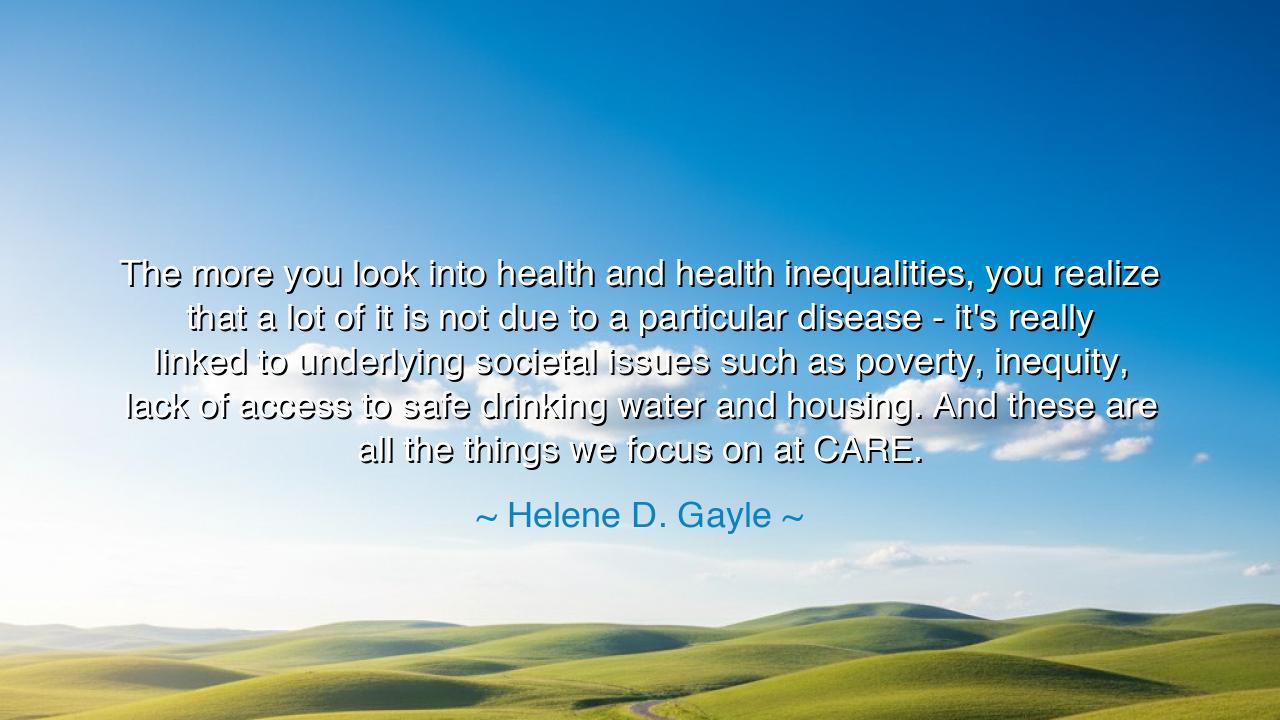
The more you look into health and health inequalities, you
The more you look into health and health inequalities, you realize that a lot of it is not due to a particular disease - it's really linked to underlying societal issues such as poverty, inequity, lack of access to safe drinking water and housing. And these are all the things we focus on at CARE.






When Helene D. Gayle said, “The more you look into health and health inequalities, you realize that a lot of it is not due to a particular disease – it's really linked to underlying societal issues such as poverty, inequity, lack of access to safe drinking water and housing. And these are all the things we focus on at CARE,” she was speaking as one who sees beyond the surface of suffering. Her words cut through the illusion that sickness is merely a biological matter. She reminds us that the body of humanity is one, and when it sickens, it is not only from infection, but from injustice. Disease is often not the cause, but the symptom of imbalance—a reflection of the fractures within our societies, the neglect of compassion, and the abandonment of the poor.
In this declaration, Gayle speaks from her long work as a physician and humanitarian. She has seen that poverty and inequity are the true epidemics of the modern world. When people live without clean water, without decent shelter, without education or dignity, their bodies bear the burden of what their society refuses to see. Tuberculosis, malaria, malnutrition—these are not merely infections of the flesh, but of the social order. The cure, she teaches, lies not only in medicine, but in justice. For until humanity learns to heal the roots of inequity, the branches of disease will keep returning, season after season.
The ancients understood this truth, though in other words. In the writings of Hippocrates, the father of medicine, we find the teaching that the health of a city depends on the purity of its air, its water, and its governance. To heal a man, one must heal the conditions that surround him. In this way, Gayle walks in the lineage of the old healers, yet her wisdom is sharpened by the knowledge of our age. She reminds us that public health is moral health, that no vaccine can protect a soul from the slow poison of despair, nor can any hospital save a nation that neglects its weakest members.
Consider the example of CARE, the organization Gayle speaks of—born from the ashes of World War II, when Europe was starving and broken. What began as a movement to send relief packages to the suffering has grown into a global mission for dignity and equality. CARE works not merely to feed the hungry, but to uproot the causes of hunger; not only to treat disease, but to build the conditions for lasting health. It embodies Gayle’s philosophy—that true healing is systemic, that charity alone is not enough without the transformation of society itself.
History offers us countless mirrors of this truth. During the cholera epidemics of the 19th century, reformers like Florence Nightingale and Edwin Chadwick discovered that clean water and sanitation could save more lives than any doctor’s skill. It was not the disease that was the enemy, but the neglect that allowed it to spread. Their work changed the world, reminding humanity that compassion must extend beyond treatment to prevention, beyond the sickbed to the street. Gayle’s voice carries this same timeless message into the modern era: that health is not a privilege—it is a right born of justice.
Her words burn with a quiet heroism, for they demand that we see suffering not as distant, but as collective. The lack of equity that robs one village of clean water or one family of shelter diminishes us all. To heal such wounds, we must look not to medicine alone but to humanity’s conscience. For what good is curing disease if we preserve the systems that breed it? What meaning is there in scientific triumph if we remain blind to moral failure?
Thus, Gayle’s wisdom is a call to every generation: to expand the meaning of healing. To be a healer, in her vision, is to build wells, to open schools, to defend justice. It is to understand that health is born from dignity, that medicine is but one branch of a tree whose roots are fairness, compassion, and hope. And just as a physician listens to the heartbeat of her patient, so must humanity listen to the heartbeat of the poor.
Final Lesson: True health is not merely the absence of disease, but the presence of justice.
Practical Actions: Look beyond symptoms—whether in a person, a community, or a nation—and seek the cause beneath. Support efforts that bring clean water, shelter, and education to the forgotten. Treat compassion as the highest medicine, and equality as the surest cure. For when we heal the conditions of life, we heal life itself—and in doing so, we restore the health of the human soul.






AAdministratorAdministrator
Welcome, honored guests. Please leave a comment, we will respond soon